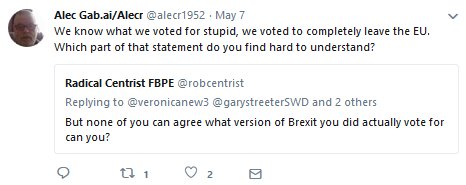It didn’t hold water, but there is always the possibility that people would hear what was said and assume.
For example, this was Chris Grayling saying “No, we’ve just voted to leave the Single Market”.
Which is, obviously, completely normal in any democracy.
Or at least, somebody told him to tell nobody in case anybody found out what everybody knew.
Something that seemed like a good idea at the time and seems a bloody good idea in hindsight.
It is an argument that then becomes “both sides” in October 2016.
Then again, it is just as awkward if it did believe this.
splcenter.org/hatewatch/2017…
The “Leave said” argument wasn’t predominant before the montage, and the use of it helped reinforce the notion of a single Brexit: “The one people voted for”. (The implicit one that Vote Leave explicitly said we were not voting for)
(The Dan Hannan clips isn’t technically pro-EEA, but it’s the first time I can find them acknowledging Vote Leaver weren’t clear since the middle of October. I really is very thin)
/End
#MontageGate










